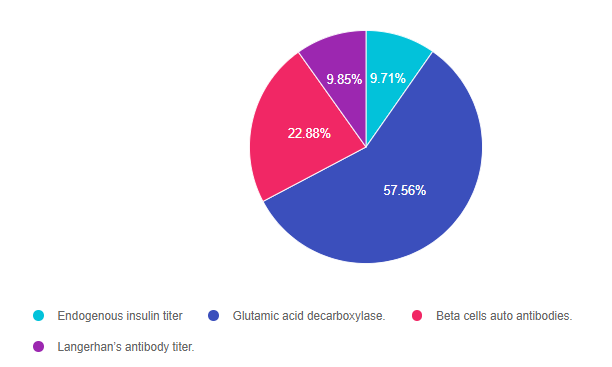
For last week’s practice question, we quizzed test takers on which labs to order for JR. 57% of respondents chose the best answer. We want to share this important information, so you can pass it on to people living with diabetes and your colleagues, plus prepare for exam success!
Before we start though, if you don’t want any spoilers and haven’t tried the question yet, you can answer it below: Answer Question
Question: JR’s mom has type 1 diabetes and JR’s dad has type 2 diabetes. JR is 21 years old and in the emergency room with a glucose of 482 mg/dl. Besides checking glucose, ketones and A1C levels, which of the following lab test can be used to determine if someone has autoimmune diabetes?
Answer Choices:
- Endogenous insulin titer
- Glutamic acid decarboxylase
- Beta cells autoantibodies
- Langerhan’s antibody titer

As shown above, the most common choice was option 2, the second most common answer was option 3, then option 4, and finally 1.
Getting to the Best Answer
Answer 1 is incorrect. 9.71% chose this answer, “Endogenous insulin titer.” This is a juicy answer. Evaluating endogenous insulin production is helpful since it reflects how much insulin the pancreas is secreting. However, it does not reveal if the beta cell loss is due to an immune-mediated response.
Answer 2 is correct. 57.56% of you chose this answer, “Glutamic acid decarboxylase (GAD)”, YES, this is the best answer. If the autoimmune blood test GAD comes back positive, it verifies that the pancreas is being destroyed through an immune-mediated attack of the beta cells. Autoantibodies against GAD are found in 80% of people with type 1 diabetes at clinical presentation.
Answer 3 is incorrect. 22.88% of respondents chose this answer, “Beta cells autoantibodies.” Another juicy answer that is very tempting. However, there is no blood test with this name. The three common antibodies tested are Islet Cell Autoantibodies (ICA), Insulin Autoantibodies (IAA), and Glutamic Acid Decarboxylase (GAD).
Finally, Answer 4 is incorrect. 9.85% chose this answer, “Langerhan’s antibody titer.” Another juicy answer that is very tempting. However, there is no blood test with this name. The three common antibodies tested are Islet Cell Autoantibodies (ICA), Insulin Autoantibodies (IAA), and Glutamic Acid Decarboxylase (GAD).
Studying for the CDCES Exam?
Enroll in CDCES Online Prep Bundle + 5th Ed ADCES Review Guide Book | 47 CEs
This bundle includes our CDCES Online Prep Bundle plus the ADCES Review Guide.
The online bundle includes Level 1, Level 2, and Level 3 (Boot Camp), plus two bonus courses. The ADCES Review Guide offers over 480+ practice questions and is a fantastic independent study tool and comprehensive resource for the Diabetes Care and Education Specialist Exam.
What is a Certified Diabetes Care and Education Specialist?
Read More: What is a CDCES? First awarded in 1986, as Certified Diabetes Educator (CDE) credential and in 2020 with a new name: Certified Diabetes Care and Education Specialist (CDCES) to more accurately reflect the specialty. CDCES has become a standard of excellence for the delivery of quality diabetes education. Those who hold this certification are known to possess comprehensive knowledge of and experience in diabetes prevention, management, and prediabetes. “Becoming a Certified Diabetes Care and Education Specialist (CDCES) is one of the best professional and personal decisions I have ever made.” – Coach Beverly Thomassian, RN, MPH, CDCES, BC-ADM
Why become a CDCES?
Three Reasons from Coach Beverly
Read More: 3 Reasons to Become a CDCES “The best part of becoming a CDCES is working with my colleagues and people living with diabetes. As diabetes educators, we hear compelling and beautiful life stories. I am astounded by the barriers they face and inspired by their adaptability, problem-solving skills, and resilience.” Reason 1: CDCES is a widely recognized certification by employers and health care professionals throughout the U.S. This credential demonstrates a specialized and in-depth knowledge in the prevention and treatment of individuals living with pre-diabetes and diabetes. Reason 2: Currently, 10% of people in the U.S. have diabetes and another 35% have pre-diabetes which means 45% of Americans are running around with elevated blood glucose levels. Given this epidemic, there will be plenty of future job opportunities. Reason 3: Having my CDCES along with my nursing degree, has opened many doors of opportunity; from working as an inpatient Diabetes Nurse Specialist in a hospital to working as a Manager of Diabetes Education in the outpatient setting to starting my own consulting company.
Sign up for Diabetes Blog Bytes – we post one daily Blog Byte from Monday to Friday. And of course, Tuesday is our Question of the Week. It’s Informative and FREE! Sign up below!
The use of DES products does not guarantee the successful passage of the CDCES exam. CBDCE does not endorse any preparatory or review materials for the CDCES exam, except for those published by CBDCE.









